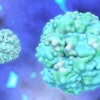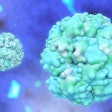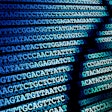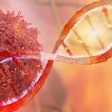
Researchers have developed a test for genetic mutations in urine that can detect bladder cancer up to 12 years before clinical symptoms occur.
The study will be presented Saturday at the European Association of Urology’s annual congress, to be held March 10-14 in Milan.
Bladder cancer is one of the top ten most common cancers in the U.S. Only half of patients diagnosed with advanced disease survive more than five years. By contrast, more than 80% of those with cancer detected at an early stage survive at least five years. However, bladder cancer diagnosis relies on a costly and invasive procedure called cystoscopy (inserting a camera into the bladder). Researchers sought a simple urine test that could help spot more early-stage cancers, avoid unnecessary cystoscopies, and accurately diagnose as well as predict the eventual likelihood of bladder cancer.
The study was based on the UroAmp test, a urine test developed by Convergent Genomics that identifies mutations in 60 genes. The new test was narrowed down to focus on mutations within ten genes. Trials for this test used samples from the Golestan Cohort Study, which has tracked more than 50,000 participants over ten years; all participants provided urine samples at recruitment. The team tested urine samples from 29 participants who developed bladder cancer during that decade, along with 98 control participants.
The test accurately predicted future bladder cancer in 19 (66%) of those 29 participants from urine samples taken up to 12 years before clinical diagnosis. Of the 14 participants diagnosed with bladder cancer within seven years of urine collection, the test predicted cancer in 12 (86%). The test was accurately negative in 94 of the 98 control participants (96%) who did not develop bladder cancer.
A different trial used samples taken prior to cystoscopy from 70 bladder cancer patients and 96 controls. Unlike the Golestan study, some samples came from patients on the day they were diagnosed, rather than years before. Mutations were found in urine samples from 50 of the 70 patients (71%) whose tumors -- some new, others recurring cancers -- were visible during cystoscopy. No mutations were found in 90 of the 96 (94%) patients with negative cystoscopies.
The results were consistent across the two different groups: individuals with known risk factors undergoing cystoscopy, and individuals assumed to be healthy. The researchers believe these results demonstrate the urine test’s potential for early bladder cancer detection, and hope it facilitates routine screening for high-risk groups, including smokers and those exposed to known bladder carcinogens.
“This kind of test could also be used when patients come to their doctors with blood in the urine, to help reduce unnecessary cystoscopies,” said lead researcher Dr. Florence Le Calvez-Kelm, of the International Agency for Research on Cancer, in a statement. “If we can identify bladder cancer early on, before the disease has advanced, we can save more lives.”



















